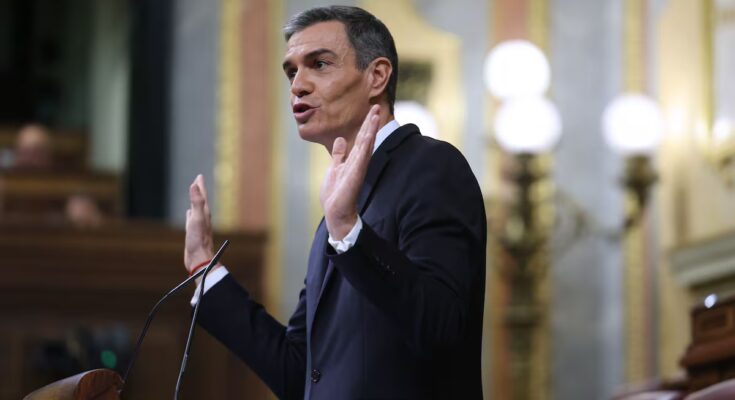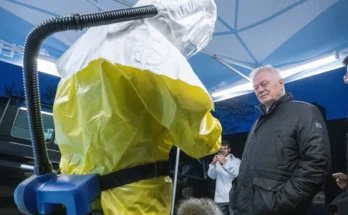The midterm debate in Congress ended after nearly six hours. It has been tough and tough at many moments, due to the unyielding attacks of the PP and Vox against the government of Pedro Sánchez for corruption and the multiple and different warnings of almost all the usual partners, but the legislature continues. This peculiar mandate continues despite the announcements of Junts on the blocking of all types of projects and initiatives, despite the threats of more radical fatigue from Podemos and the more moderate and painful warnings of PNV, ERC, Coalition of the Canary Islands or BNG. Nothing is finished. A hypothetical motion of censure by the right and far right was not announced, nor was a question of confidence or an electoral advance granted by the president. The president confronted the leader of the PP, Alberto Núñez Feijóo, on his commitment to public services in the face of cuts, privatizations and the mismanagement of the PP barons in their autonomies. Feijóo stated: “Don’t count on me at all.”
At the end of the morning, after more than five hours of frantic interventions, BNG spokesperson, Néstor Rego, recognized that it was a “curious” aspect to say the least. The debate was scheduled on so many current issues (international summits, corruption, parliamentary instability and quality of public services) and at such a specific time (mid-term) that it could be used for almost anything, and that’s what happened.
The president thus delivered an initial 60-minute speech in which he avoided any self-criticism on the cases and problems that threaten his government and the PSOE and referred to the comparison with his ideological model of millionaire support for public services, especially in health and education, to demonstrate that, despite the more than 300,000 million euros transferred in his seven years in La Moncloa to all the autonomous communities, the main barons of the PP in those territories have not been able to manage them well and implemented a plan to dismantle them and encourage their privatization. Sánchez also named Feijóo “co-responsible” for that strategy. He then scorned Feijóo’s “destructive” and useless opposition and confirmed that, despite his parliamentary shortcomings, he has a “stable, functioning and advancing minority coalition government” in line with what is already happening in many European democracies around us. Faced with the corruption that accuses his last two secretaries of the PSOE organization, the president of the party got away with recounting all the plans announced or implemented to fight this scourge and, above all, with the guilt that haunts the PP for having been convicted and having more than 30 cases still pending trial.
Once the debate had been set up in these terms, Feijóo felt challenged by Sánchez as “leader of the opposition to the PP” and highlighted the degree of personal and political enmity to which the two leaders of the most important parties had reached when he stated in the session diary: “Don’t count on me at all”. The president of the PP accused Sánchez of progressively degrading the country’s horizon to the point of placing it in a historic “moral crisis” and lashed out at the partners of the Executive to very directly reproach the PNV and Junts for having “normalized the unacceptable”. Feijóo then painted a Spain lost in the worst poverty figures, listed the cases that now affect the PSOE, but peppered them with allusions to Sánchez’s deceased father-in-law, his brother and his wife and sparked a moment of laughter in the Chamber when he promised that when he governs he will allocate his first vice president to the housing sector. Some socialist deputies joked amid widespread laughter that “Abascal already has a portfolio.” In the chapter of announcements and promises, Feijóo anticipated another decision he will make if he reaches La Moncloa: “I will not grant amnesty to you or yours.”
The leader of Vox, Santiago Abascal, designed a government “awash in corruption” and waiting for Sánchez to “avoid prison”, but was more enigmatic when he advised Feijóo not to start distributing ministries now, so that what happened in the 2023 elections does not happen to him. For Abascal, who is right now negotiating with the national PP the future of the Valencian government after the definitive fall of Carlos Mazón, the People’s Party are the same as the PSOE, they are together in Brussels and Ceuta, they agree to increase the number of deputies in Castilla-La Mancha and they share the General Council of the Judiciary.
Even Sánchez’s usual remaining allies in Congress did not listen to him, despite Feijóo’s contempt. Sumar’s spokesperson, Verónica Martínez Barbero, reminded her coalition partner of the outstanding issues not to be relegated to pressure on Palestine, housing and the program to close nuclear power plants. Gabriel Rufián, of the ERC, insisted on these demands, but spent more time attacking Feijóo extremely harshly for having supported the “miserable Mazón” this year and especially against Junts, their interests and the counterclaim that they are regularly accused of supporting this government “in exchange for nothing”.
The representative of Junts began and ended by neglecting Rufián as a poorly disguised spokesperson for the PSOE and repeating the message of her last weeks after the breakdown of her parliamentary support for Sánchez. His spokeswoman, Míriam Nogueras, asked Sánchez to explain how he intends to continue the legislature without his support and reiterated that the president “does not have a word, does not conform and is only interested in power” and once again listed the laws and initiatives blocked in Parliament. On the approved and controversial law on amnesty and the granting of pardon to the leaders of the processes the independence movement didn’t mention anything.
Sánchez then responded to Junts and others who referred to the evident parliamentary instability by confessing that he too is not “fascinated” by the reality of the current arithmetic of Congress, but assumes that is what the Spaniards decided at the polls and confirmed that he is not willing to consult them every time PP and Vox ask for it. He also addressed Junts with a no-return reflection: “My group needs your votes, but your parliamentary group also needs our votes. Or will you negotiate with those who aspire to ban Catalan and put an end to your self-government?” Sánchez, yes, asked that PP and Vox allow elections now, but in the Valencian Community.
EH Bildu, for his part, and BNG, Podemos and Compromís, of the Misto Group, regretted that this critical moment of the legislature was not taken advantage of to reset everything and launch more courageous actions in various sectors, but especially in the housing sector. Ione Belarra, of Podemos, even listed six points to “break the right and the far right” which had more echo in PP and Vox than in Sánchez. The PNV has long warned of the distressing situation it observes in the “vaudeville and circus” that the Cortes have become and has also drawn attention to the fact that bilateral agreements are making progress “but not as they should”. Cristina Valido, of the Canarian Coalition, tried unsuccessfully to bring order to so much dialectical chaos, but ended up taking it for granted that she would abandon the debate without a motion of censure, nor a question of confidence, nor early elections.
Feijóo called Sánchez a “Tertulian” and identified him as the presenter of a TVE morning magazine or some news program about their territorial disconnects. Abascal defined him as a “moderate cardinal” because the president referred to a papal provision. Rufián was tempted to go further and imagined a TVE controlled by PP and Vox with Bertín Osborne in charge of the news, now hosted by Pepa Bueno, and the Andalusian singer José Manuel Soto replacing David Broncano in The revolt. Rufián finally challenged Feijóo to clarify whether he said he was the first to speak to Mazón on the night of the Dana disaster and whether he advised him not to request the emergency declaration. Feijóo did not clarify this, but what he underlined in his speech is that that night he spoke “first” about Sánchez with Mazón and visited the area before.



